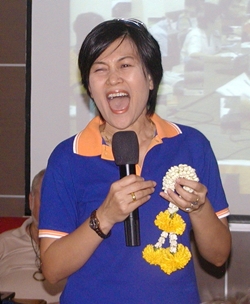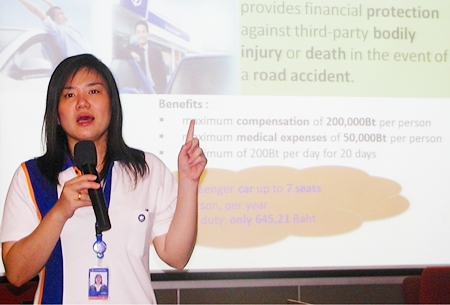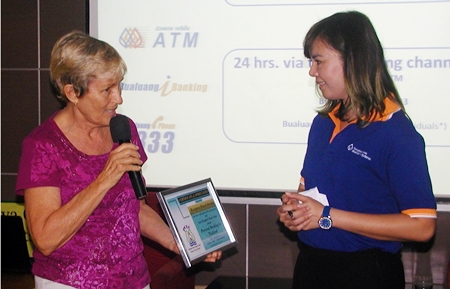Thailand’s banking system offers a variety of products for expats living in or visiting Thailand. The Sunday, April 28, meeting of the Pattaya City expats Club featured a presentation by a team of people from Bangkok Bank. The presentation was led by Supimon Pachana, Assistant Vice-President, Sales and Support; and Waraporn Brand-Srinaka, from Bangkok Bank’s Global Payment Services Department – Expat Banking Project.
Supimon introduced the members of the team, most of whom were from the bank’s thirteen branches in Pattaya. During the meeting, she also presented several audience members with free merchant coupons via some entertaining games.
 Supimon Pachana, Assistant Vice President – Sales Support ‘warmed’ the PCEC Crowd with an inspiring performance.
Supimon Pachana, Assistant Vice President – Sales Support ‘warmed’ the PCEC Crowd with an inspiring performance.
Waraporn provided information about Bangkok Bank products and services available to foreigners. Although the information is specific to Bangkok Bank; much of it also applies to other banks, though some of the particulars may vary from bank to bank. She explained that expats working or retiring in Thailand can open a bank account here. So can foreigners who are in Thailand on a tourist visa. She reviewed the documents required to open an account for each category of expat.
At Bangkok Bank, there are three types of accounts expats can open: (1) savings, (2) fixed deposit; and (3) foreign currency deposit. The savings accounts pay interest, calculated daily and credited every six months. The current rate of interest is 0.75%. At Bangkok Bank, the minimum deposit for a fixed deposit account is 2,000 baht. Customers can invest in three-month, six-month, one-year, two-year or three-year deposits that offer higher interest rates. The minimum deposit to open a foreign currency deposit account is US$1,000. She noted that expats can repatriate funds from their foreign currency deposit account to their home countries without having to submit supporting documents. Further, expats can transfer funds out of Thailand from their baht accounts. If the amount of the transfer is less than US$50,000, the customer must specify the source of the funds. If the transfer is US$50,000 or more, the customer must provide evidence of the source of the funds being transferred.
Waraporn mentioned that for all types of accounts, there is a 15% withholding tax on interest earned. Expats can redeem the amounts withheld by: (1) contacting their home branch to obtain a Certificate of Withholding Tax; (2) requesting a tax ID from http://www.rd.go.th; (3) downloading a Tax Return Form (Por Ngor Dor 90) from the same website; and (4) submitting the form to the Thai Revenue Department office (or submitting it online) before March of each year.
 Nadath Boonsawangdee, Assistant VP – Pattaya Branch talks about the Pattaya Branches of Bangkok Bank.
Nadath Boonsawangdee, Assistant VP – Pattaya Branch talks about the Pattaya Branches of Bangkok Bank.
At Bangkok Bank, expats can obtain three types of cards: (1) a Be 1st Visa Debit Card; (2) a Be 1st Smart Debit Card; and (3) a credit card. Waraporn said that the Be 1st Visa Debit Card can be used to withdraw funds at an ATM in Thailand, and at ATMs in other countries that display the “PLUS” sign. It can also be used to pay for purchases at stores in Thailand, and at stores in other countries that display a “VISA” sign. In addition, this card can be used to pay bills and top up mobile phones at an ATM in Thailand. The Be 1st Smart Debit Card can be used only at Bangkok Bank ATMs in Thailand, Waraporn said. Customers who receive this card have a chip embedded for additional security. This is useful if the customer maintains a large balance in the account.
Waraporn explained that expats working in Thailand can obtain a Bangkok Bank credit card if their salary is processed to a Bangkok Bank account and if they have a monthly income of at least 100,000 baht. Expats who are retired here may obtain a credit card if they are assessed by the bank as being able to meet the payments and if they provide collateral. The collateral has to be in the form of a cash deposit – usually a minimum of 50,000 baht, but it may be less.
Expats on long stay visas may also set up Internet banking, Waraporn said. Internet banking at Bangkok Bank is called “Bualuang Banking.” Through Internet banking, expats can transfer money to any bank account in Thailand, pay bills and buy and sell mutual funds. Internet banking can be accessed from any country but customers should note that they must use a Thai mobile phone to receive a one time password that may be needed to authenticate certain transactions.
Expats who have bank accounts in other countries can transfer funds from these accounts to their Bangkok Bank accounts. For expats who have accounts in the US or the UK, Waraporn noted the process is simpler and the costs of the transfers can be reduced if the transfers are made via the Bangkok Bank’s branches in New York and London.
 Bangkok Bank staff briefly outline the many insurance options available through the bank.
Bangkok Bank staff briefly outline the many insurance options available through the bank.
Expats can purchase a fixed income fund at Bangkok Bank, called “Bualuang Thanatavee.” She also said they can open a securities account. The Bangkok Bank team then provided information on insurance products and the process for expats purchasing a condo in Thailand. For more information on the Bangkok Bank’s products for expats, they provided the following link to their website: http://www. bangkokbank.com/Bangkok Bank/PersonalBanking/SpecialServices/Foreign Customers/Pages/default. aspx
After the presentation, Master of Ceremonies Richard Silverberg updated everyone on upcoming events and called on Roy Albiston to conduct the Open Forum, where questions are asked and answered about expat living in Thailand.
For more information about the many activities of the Pattaya City Expats Club, visit their website at www.pattayacityexpatsclub.com.
 Waraporn Brand-Srinaka, Senior Sales & Marketing Specialist, Foreign Customer Segments provided information about Bangkok Bank products and services available to foreigners. Here she receives a Certificate of Appreciation for the Banks informative presentation.
Waraporn Brand-Srinaka, Senior Sales & Marketing Specialist, Foreign Customer Segments provided information about Bangkok Bank products and services available to foreigners. Here she receives a Certificate of Appreciation for the Banks informative presentation.




